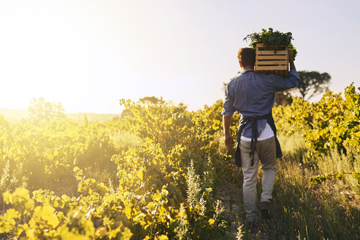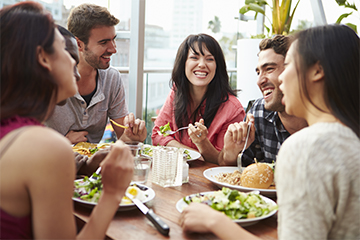Sustainable diet: definition
A sustainable diet is a food system that guarantees access to healthy food in sufficient quantities for all. It is also a way for you to act for the environment, social justice and economic viability. This system relies on four pillars: health, environment, social ethics and economic returns.
Upcoop is committed to a sustainable diet. Such a commitment means implementing responsible dietary practices to fulfil a long-held ambition: giving as many people as possible access to healthy, good quality, eco-friendly food. With our solutions, we encourage the many to enjoy all the benefits a lunch break can offer: a better-balanced diet, time to disconnect and social bonding.
What are the benefits of a sustainable diet?
Our dietary choices have a direct impact on our health, our environment, and our society. But what choices do we have?
Nutritional quality
A sustainable diet is a healthy diet that provides all the necessary nutrients a body needs to function properly: vitamins, minerals, proteins, carbohydrates, and lipids. It prioritises unprocessed foods that are rich in fibre with limited amounts of salt, added sugars and saturated fats. A sustainable diet is directly connected to preventing chronic diseases and supports better global health.
Respect for the environment and animal welfare
A sustainable diet relies on agricultural practices that respect the ecosystem: organic farming, agroecology, low levels of pesticides, biodiversity conservation. It limits the carbon footprint while prioritising seasonal and local products and includes animal welfare in production modes.
Economic support to local producers
Eating sustainably is a way for you to support a fairer local economy.
A sustainable diet supports fairer compensation for every link in the food chain – from the producer to the distributor – guarantees access to products for everyone.
Reducing food waste
According to a study conducted by the ADEME in 2022, a French citizen on average throws away 58 kg of food per year; only 24 of which are still edible. It amounts to a loss of €100 per capita. Such an amount is expected to rise quickly during inflation, especially when expensive products such as meat or fish are being wasted.
Limiting waste not only reduces our environmental impact but also preserves our purchasing power and gives a new meaning to our consumption.
Good practices to adopt a sustainable diet daily
To include a sustainable diet in your everyday life, you should take a small step at a time and implement easy habits.
Supporting local and seasonal products
A sustainable diet often begins with what is on your plate. Supporting local and seasonal products (Association pour le Maintien de l’Agriculture Paysanne, small producers…) allows you to reduce your transport carbon footprint, support local producers and enjoy fresher, tastier products.
Seasonal calendar:
- Winter: leeks, cauliflower, apples, clementines, Jerusalem artichoke, lamb’s lettuce, etc.
- Spring: radishes, asparagus, strawberries, spinach, spring onions, peas, etc.
- Summer: tomatoes, aubergines, courgettes, peaches, melon, peppers, etc.
- Fall: onion squash, grapes, figs, pears, carrots, red cabbage, etc.
Tip: download our sustainable diet guide to have access to the full list of seasonal foods.
Consuming products from sustainable farming
Consuming a sustainable diet means choosing products from farms with responsible practices such as organic farming, agroecology, regenerative agriculture, farming practices that respect animal welfare, fair labels (AB, Demeter, Fairtrade)…
With Upcoop: we collaborate with committed stakeholders like Bleu-Blanc-Cœur
Prepping your meals with clever cooking habits
Because a sustainable diet necessarily involves cooking your own meals, you will just need a few tweaks to cook sustainably without any hassle:
- Freeze fresh foods 3 to 4 days after purchase before they go bad.
- Reuse the leftovers (make a soup, a gratin, or a stir fry with wilted vegetables)
- Schedule your meals to buy nothing but the ingredients you will need
Limiting ultra-processed products
Food colourings, flavour enhancers, added sugar, multiple packages… ultra-processed products are detrimental to our health and our environment.
Adopting a sustainable diet also means going back to simple products, cooking more often, carefully reading ingredients lists on food labels, and decluttering your cupboards.
You do not need to be a chef: make a mixed salad, a stew, a dessert, etc.
Encouraging companies and communities to offer and promote sustainable options
Eating sustainably is not just a matter of personal preference: it comes from a joint decision to implement new consumption modes.
Inside schools, companies, or communities, introducing organic, local, seasonal products in collective catering is considered a legal standard under the EGalim law (50% of sustainable products, 20% of which are organic since 2022)
Training kitchen crews, finding new menus, implementing local sourcing… there is so much that can be done.
What are the future trends for a sustainable diet?
New uses, new technologies but also new ways of producing and consuming are shaping the way we envision a more sustainable diet.
Plant-based diet and alternative proteins
According to the Barometer of French meat consumption, in 2025, 53% of consumers stated that they have lowered their consumption of meat, mainly for environmental, health, or ethical reasons.
A sustainable diet increasingly relies on a varied, accessible plant-based diet, like vegetarianism or flexitarianism. Far from being limited to steamed vegetables, it includes various alternative proteins such as:
- Legumes: lentils, chickpeas, kidney beans… sources of proteins, fibre, minerals
- Whole grains: quinoa, wholegrain rice, spelt.
- Innovative products: veggie steaks made of peas, mycoproteins, fermented proteins, seaweed, even lab-grown meat.
Food companies invest massively in developing more sustainable offers, while preserving the taste and staying faithful to the product the consumers expect.
However, this transition must remain both inclusive and balanced. The goal is not to enforce a zero-meat standard but to offer a wide range of possibilities, reduce the environmental and ethical impact of intensive farming and offer various options that are suited to every profile.
Eating sustainably does not mean banning meat or fish from our diet. Instead, a sustainable diet allows us to reconsider how we can include meat in our plates.
Tip: visit the Mrgoodfish platform to see the list of seasonal fish
The boom of urban and local agriculture
Agriculture has long been relegated to rural zones; but it is now present in cities.
Buildings’ roofs turned into vegetable gardens, vertical farms, shared gardens at the bottom of buildings, hydrophonics in basements or in containers... all these alternatives bring production and consumption together, through an innovative sustainable diet.
This trend is directly linked the recent rise of ultra-short supply chains. These emerging practices foreshadow a food economy that is more local, participative, and less dependent on global, standardised supply chains.
Some notable urban farms in France:
- La cité maraîchère (Romainville, Île-de-France): launched in 2021, this local vertical farm is located in a tower and produces fruit, vegetables, and herbs cultivated through hydrophonics.
- Nature urbaine (Paris, 15e): the biggest urban rooftop farm in Europe (14,000 m²) set in Parc des expositions de la Porte de Versailles. Fruit and vegetables are cultivated through hydrophonics to meet the needs of neighbours and restaurant owners.
- Le paysan urbain (Bagnolet, Marseille, Bordeaux): a social integration company that cultivates organic microgreens and develops educational and participative projects in working-class areas.
Functional diet, health and well-being
The rise of “functional” foods, which combine nutritional value, health benefits and low environmental impact, is marking a significant step in our consumption practices.
Functional foods include superfoods like chia seeds, spirulina, goji berries and turmeric; natural probiotics such as kefir, kombucha, miso; or organic food supplements made from adaptogens, seaweed, or essential minerals.
This trend is supported by a growing demand for products that boost immunity, improve digestion, reduce stress or inflammation… without harming the planet. A sustainable diet that comes in handy and promotes unprocessed or minimally processed ingredients, and which come from sustainable agriculture. They are often full of micronutrients, the best allies for our health!
A 100% sustainable collective catering
Millions of meals are served every day in school canteens, company restaurants, hospitals, or retirement homes. Transforming these daily meals means genuinely acting on the food habits of an entire population.
Since the EGalim law, public structures are required to include at least 50% of organic food in their menus; 20% of which must be produced by organic farms. Today, many communities go even further: local catering, various vegetarian options, training for kitchen teams, waste reduction, composting…
Some of them even experiment with a zero-waste, low-carbon collective catering, by rethinking the whole food supply chain – from the sourcing to the plate. This sustainable diet involves joint purchases in short food supply chains, a sharp management of the stocks, better food portions, and prioritising homemade meals.
How does Upcoop participate in the sustainable diet development?
Ensuring people have access to enough good quality products that respect the environment, and which are economically accessible and profitable for the entire food chain is a collective challenge. This is what sustainable diet is about: public health, food insecurity, culinary education, and food waste issues. Our ambition is to give everyone the tools to act for a healthy, sustainable diet.
Giving our beneficiaries the tools to consume better
To make sustainable food a tangible reality, we need to make it easier to access.
Launching the “Agir ensemble pour une consommation plus responsable” programme (Acting together for more responsible consumption)
Our programme “Acting together for more responsible consumption” aims to redefine how Upcoop uses vouchers and solutions:
- Giving beneficiaries the tools to better consume, with more transparency, traceability and variety.
- Encouraging shopkeepers and restaurant owners to improve their practices.
- Allowing companies and communities to better target their social policies and grants.
- Showcasing the committed actors via concrete, easy-to-access tools
Implementing a “responsible consumption” filter in the Store Locator
Upcoop gives its beneficiaries of UpDéjeuner vouchers the possibility to locate restaurants and shops that are committed to a sustainable and responsible consumption thanks to its “responsible consumption” filter available on its Store Locator.
Giving local actors the tools to have a bigger impact on society
We publish the initiatives of our committed partners working towards a sustainable diet, in line with our CSR approach.
- Action Against Hunger (since 2009): with the “Je Dej, Je Donne” initiative and the collection of UpDéjeuner meal vouchers, we help the most vulnerable people have access to a good quality diet.
- Bleu-Blanc-Cœur (since 2012): we promote a healthy diet for all by supporting a quality approach that preserves public health.
- La tablée des chefs (since 2023): we provide future chefs training on how to cook healthy meals. We also work alongside trade and catering professionals to fight food insecurity.
- La ferme des possibles (since 2024): we support a farm that serves as a natural setting, a community hub, and a welcoming environment. Since 2024, this place of solidarity has fought against isolation and has provided access to a healthy diet for all, including the most vulnerable ones. It is a resourceful area that contributes to developing inclusive neighbourhoods.
- Veni Verdi (since 2024): thanks to a collaboration between 2 urban microfarms, we support a project that tackles both food and environmental resilience in the urban neighbourhood of Salamandre. Our goal is to produce a local and good quality diet that is affordable to low-income people. We directly involve them in supporting a healthy diet, create a local microeconomy revolving around it, foster social bonding, develop connections between our territories and raise awareness of environmental issues and climate change.
- Re-belle (since 2024): this project aims to develop an alternative dietary production mode, which allows us to raise awareness and to recycle large quantities of unsold fruit and vegetables in order to avoid waste. We also offer a customised back-to-work training to the inhabitants of a priority neighbourhood, the department of Seine-Saint-Denis.
In addition to the fight against food or education insecurity, these projects also enable more responsible new models to emerge, make populations more independent and prevent individuals from wasting resources. They all rely on a strong local presence and tackle environmental, social, cultural, and educational issues. Social bonding and human values give meaning to this societal commitment. The organisations we support develop useful, sustainable projects that are not confined to one-off food assistance.
Allowing communities to target public grants at committed local stakeholders
We cooperate closely with local authorities to help distribute social grants in a responsible way. We distribute food grants to local shops and producers and make the sustainable diet a lever for inclusion, social justice, and territories’ revitalisation.
With this in mind, we have launched the Cohésia card in priority urban neighbourhoods. This system provides beneficiaries access to a good quality diet and supports the committed economic stakeholders in their territories. Funding bodies have created an acceptance network so that grants are being distributed in a more targeted way, which helps local authorities have a bigger impact when it comes to social and environmental issues.
Helping organisations make their business activities and practices more sustainable
To achieve these goals, we support all kinds of organisations implementing solutions that allow for adequate lunch breaks.
Upcoop is very much aware of the issues related to our consumption. Our products are evolving, and we are now putting all stakeholders of sustainable diet and responsible consumption at the forefront: producers, distributors and resellers committed to quality. Our goal is to further contribute to the dynamism of the local economy.
We have developed the Up+ programme, a relational system that rewards the UpDéjeuner cardholders whenever they make a purchase. Every time they buy a meal in a sustainable shop, bonuses are automatically credited to their account. It is a fun and simple way to encourage people towards a sustainable diet… And to support the restaurant owners who are committed to this mission.
Why should you choose a sustainable diet?
With widened access, concrete solutions, targeted support, Upcoop’s stakeholders use their expertise to make a sustainable diet simpler, attractive and more accessible to everyone.
More options from which to choose
Thanks to our solutions, beneficiaries have access to a network of 253,000 shops, restaurants and committed convenience stores working all over our territories. Our national network reaches each of the 25 countries where the Upcoop group operates. It continues to grow to provide access to a sustainable, healthy, varied, local, good quality diet every day for all – wherever they live or work.
Giving the power to consume responsibly
Our goal is not to impose a diet but rather to raise consumer awareness and encourage people to make more informed choices based on several criteria: nutritional quality, short cycles, seasonal and organic products, carbon footprint, costs… Information should be clear, transparent and straightforward. All the company members have a common interest in guaranteeing the overall health of the employees thanks to good dietary habits.
We encourage individuals to take meaningful initiatives that support a sustainable diet, such as eating local products without compromising on quality. Because our network can rely on its wealth and its ability to constantly evolve, we can give everyone the possibility to follow their consumption habits: major restaurant chains or convenience stores, access to organic, local, loose products…
Daily financial support for the most vulnerable people
Our solutions provide the most vulnerable people access to a varied, good quality diet. This is why we help communities deploy public policies that are targeted at the most disadvantaged groups.
Results and objectives for the future
Our initiatives have a significant impact on communities and the environment. For example, thanks to our partnership with Action Against Hunger since 2009, we have collected around €9-million worth of meal vouchers, which allowed us to save966,580 children from malnutrition. Likewise, our cooperation with Bleu-Blanc-Cœur helps promote farming practices that respect human health and the environment, thus contributing to preserving soil health and reducing greenhouse gas emissions.
We have ambitious goals for the future. We want to extend our partnerships and reinforce our commitment in favour of a sustainable diet. We are also planning on launching new initiatives to support producers, restaurant owners, and help consumers eat better.
Our mission is to contribute to a fairer, healthier, and more sustainable food system for everyone.






























![[Translate to anglais:] [Translate to anglais:]](/fileadmin/_processed_/1/8/csm_Portrait_Youssef_Achour_90c4c665fd.jpg)

